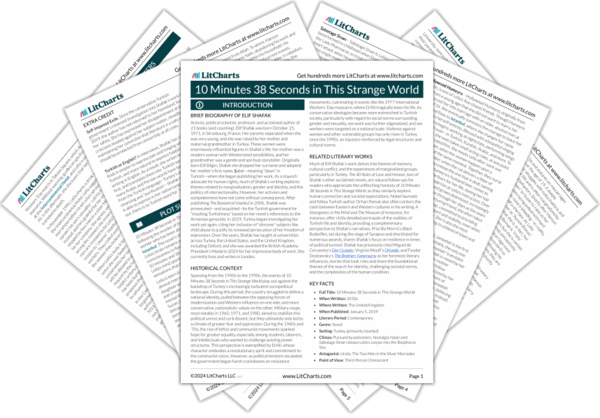In all its various forms—rivers, seas, and rains—water represents connection and evolution. When Leila is born, the midwife rinses her with holy water from the Zamzam Well. Her father hopes she will be “pure as water,” embodying the chastity and obedience expected of women in his patriarchal world. While he sees water as a metaphor for an untainted, controlled existence, Leila’s own journey with water is naturally much more dynamic and liberating. Submerged in the Bosphorus Sea after her death, Leila experiences a profound sense of freedom, finally unburdened by the unrelenting societal judgments and traumas she faced in life.
Nostalgia Nalan’s idea of a “water family” speaks to this same fluidity. She suggests that true family is formed not by blood relations or rigid structures, but by bonds that are adaptable, resilient, and able to flow around obstacles. These relationships, cleansing and liberating, are as essential as water. As Leila’s five friends exhume her body from the Cemetery of the Companionless in the middle of a rainstorm, the symbolism of water as a sign of evolution becomes all the more apparent. In this scene, the rain heralds Leila’s entry into a new plane of existence, and her friends’ dedication reflects the enduring connection between those who, like Leila, have been marginalized, but who still have close and fulfilling relationships with others.
Water Quotes in 10 Minutes 38 Seconds in This Strange World
There was so much she wanted to know. In her mind she kept replaying the last moments of her life, asking herself where things had gone wrong—a futile exercise since time could not be unraveled as though it were a ball of yarn.

Unlock explanations and citation info for this and every other 10 Minutes 38 Seconds in This Strange World quote.
Plus so much more...
Get LitCharts A+In the first minute following her death, Tequila Leila’s consciousness began to ebb, slowly and steadily, like a tide receding from the shore.
“My shiekh says Allah will curse you and I will live to see the day. That will be my compensation.”
There were drops of condensation on the window. She touched one gently with her fingertip, held it for a second, and then let go, watching it roll down. A pain throbbed somewhere inside her body, in a place she was unable to locate.
“Don’t phone us again,” he said. “If you do, we’ll tell the operator we are not accepting the call. We don’t have a daughter called Leyla. Leyla Afife Kamile: you don’t deserve those names.”
While it was true that nothing could take the place of a loving, happy blood family, in the absence of one, a good water family could wash away the hurt and pain collected inside like black soot. [...] But those who had never experienced what it felt like to be spurned by their own relatives would not understand this truth in a million years. They would never know that there were times when water ran thicker than blood.
Istanbul was an illusion. A magician’s trick gone wrong.
Istanbul was a dream that existed solely in the minds of hashish eaters. In truth, there was no Istanbul. There were multiple Istanbuls—struggling, competing, clashing, each perceiving that, in the end, only one could survive.
[...] it didn’t matter anymore, the question of why they were not meeting his comrades and of what the revolution was going to be like in that bright future that might or might not come. Perhaps nothing was worth worrying about in a city where everything was constantly shifting and dissolving, and the only thing they could ever rely on was this moment in time, which was already half gone.
“Nice to see you, finally,” said the fish. “What took you so long?”
[...]
Smiling at her confusion, the blue betta fish said, “Follow me.”
Now finding her voice, Leila said, with a shyness she could not conceal, “I don’t know how to swim. I never learned.”
“Don’t worry about that. You know everything you need to know.”












